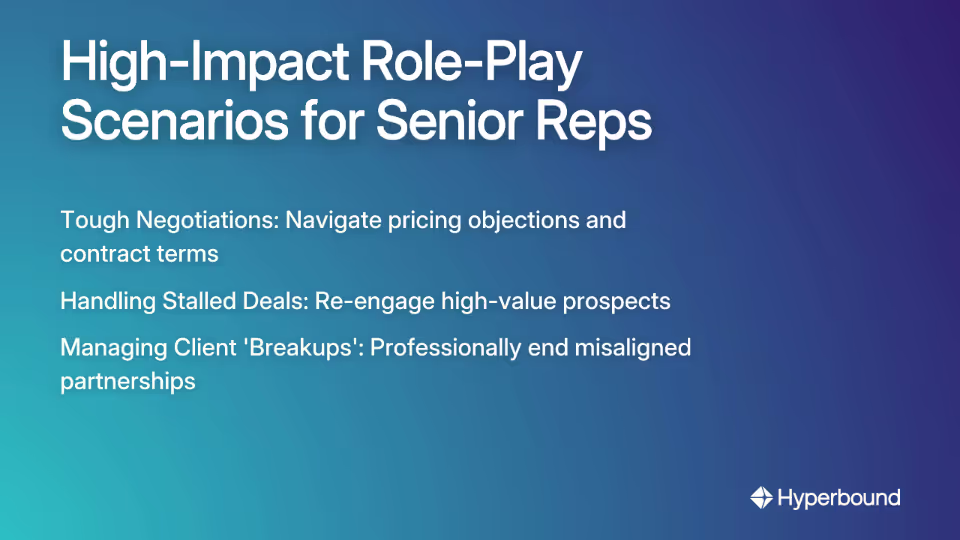
Ask any seasoned sales rep about role-play, and you'll likely hear a groan. It's often dismissed as "performance theater for middle managers" or frustrating "busywork" that feels disconnected from the real world.
"If I could act well enough for role play to be effective, I'd be doing that instead of sales," one veteran rep told me, capturing the frustration many experienced professionals feel when forced to participate in yet another mock call.
And let's be honest—they have a point. Traditional sales training exercises often miss the mark for senior reps. As one experienced salesperson put it, "You can't recreate a live customer meeting because there's so many factors that go into how a conversation goes." When role-playing sessions fail to reflect the complexity of real-world sales scenarios, they inevitably feel like a waste of valuable time.
But here's the truth that might surprise you: The problem isn't role-playing itself—it's how it's being applied.
For senior reps, the value of role-playing isn't in practicing a 30-second elevator pitch or rehearsing basic discovery questions. Its true power lies in strategic application, mentorship opportunities, and leveraging new technologies that address the fundamental weaknesses of traditional approaches.
This article explores how to transform role-play from a dreaded chore into a powerful tool for sharpening elite skills—even for your most experienced sales professionals.
Why Senior Reps Are Right to Hate Traditional Role-Play

Before we explore solutions, let's validate the legitimate frustrations many seasoned reps experience with conventional role-playing exercises:
Unrealistic Scenarios Fall Flat
Many sessions use generic scripted scenarios that don't reflect the complex, multi-stakeholder deals that senior reps manage. As one rep noted on Reddit, these scenarios often feel fake and unrealistic, "even when they're customized for our industry." This disconnect makes the entire exercise feel pointless.
Feedback That Fails to Deliver
Perhaps the most damaging aspect is the poor-quality feedback. Reps regularly complain about a "lack of qualified moderators who can provide meaningful critiques." The feedback is frequently vague and unhelpful—"you need to work on closing"—without any actionable guidance on how to improve.
The "Performance Theater" Effect
When role-play is poorly structured, it becomes a performative exercise where participants are "just trying to memorize their lines and not embarrass themselves." It devolves into a structured approach that feels forced and awkward, stifling the natural cadence of a real conversation.
The Forgetting Curve Problem
Compounding these issues is what learning scientists call the "forgetting curve." According to research cited by Richardson, sales reps forget a staggering 79% of their training within 30 days without proper reinforcement. This makes ineffective role-play not just a waste of time but an actively harmful missed opportunity for skill development.
The truth is, when these elements combine, traditional role-play becomes exactly what senior reps fear—an exercise in futility that takes them away from actual selling.
The Evolution of Practice: Moving from Basic Pitches to Strategic Refinement
For role-play to deliver value to experienced professionals, it must evolve beyond basic pitch practice. The focus needs to shift from what beginners need (learning the fundamentals) to what experts crave (strategic refinement and mastery).
While junior reps benefit from practicing discovery calls, product demos, and elevator pitches, senior reps need something entirely different. They need exercises that challenge their strategic thinking, help them pressure-test complex deal strategies, and leverage their expertise to elevate the entire team.
Advanced Role-Play in Action: Two Powerful Frameworks for Senior Reps
Let's explore two strategic frameworks that transform role-playing from a basic training exercise into a powerful tool for elite sales professionals:
Framework 1: Strategic Deal Coaching Through High-Stakes Simulation
Instead of practicing generic scenarios, use role-play to workshop live, complex deals. This immediately makes the exercise relevant and valuable for experienced reps.
Focus on These High-Value Scenarios:

Tough Negotiations: Practice navigating pricing objections, feature trade-offs, and difficult contract terms. These pressure-cooker scenarios help experienced reps refine their objection handling and closing techniques, even when they already have years of experience.
Handling Stalled Deals: Role-play different strategies to re-engage a high-value prospect who has gone silent. This helps reps identify the root cause and craft effective outreach that breaks through the silence.
Managing Client "Breakups": Practice the uncomfortable but necessary skill of professionally parting ways with a client who is no longer a good fit. This requires maintaining positive relationships while standing firm on your company's needs—a delicate balance that benefits from rehearsal.
When these exercises focus on actual deals in the pipeline, they transform from theoretical exercises to practical strategy sessions with immediate application. Even the most skeptical veteran rep can see the value in pressure-testing their approach before a million-dollar negotiation.
Framework 2: Role-Play as a Mentorship Vehicle
One of the most powerful applications for senior reps is to shift their role from "student" to "mentor." This validates their experience and leverages their knowledge to uplift the entire team.
The Power of Mentorship (With Data):
The impact of mentorship extends beyond just knowledge transfer. Research shows that sales reps with mentors generate 18% more revenue than their peers. Additionally, 76% of employees report they're more likely to stay with a company that offers continuous training and growth opportunities.
How It Works:
In this model, the senior rep plays the role of either the coach or the difficult customer, guiding a junior rep through a challenging scenario. They provide real-time feedback based on their years of experience, turning the session into valuable knowledge transfer.
This approach creates a win-win situation: junior reps receive personalized coaching from someone who's "been there and done that," while senior reps sharpen their own skills through the process of articulating and teaching their strategies.
As noted by sales training experts, effective mentors need industry expertise, strong communication skills, empathy, and a genuine investment in the success of their mentees. When experienced reps embrace this role, they often find renewed engagement and purpose in their own development.
The AI Revolution: Solving Traditional Role-Play's Biggest Flaws
Perhaps the most exciting development in sales training is the emergence of AI-powered role-play, which directly addresses many of the core complaints about traditional methods.
1. Eliminates Judgment and Creates Psychological Safety
AI provides a low-pressure, safe environment to practice, fail, and experiment without the fear of judgment from peers or managers. This is crucial for building confidence and encouraging authentic practice rather than performative exercises.
AI removes the "performance theater" aspect, allowing reps to focus purely on skill improvement.
2. Provides On-Demand, Scalable Practice
Unlike traditional role-play that depends on a manager's schedule, AI-powered tools are available 24/7. Reps can practice on-demand, accelerating their improvement and facilitating continuous skill development.
This scalability is a game-changer. Platforms like Hyperbound empower reps with self-serve practice, saving managers countless hours on manual coaching and reviews so they can focus on high-impact strategic guidance.
3. Delivers Objective, Data-Driven Feedback
AI moves beyond subjective, biased feedback. It provides objective, consistent performance metrics on specific skills—exactly what senior reps need to fine-tune their approach.
Modern AI coaches, such as Hyperbound's AI Real Call Scoring, can analyze talk-to-listen ratios, sentiment, pace, and how effectively objections were handled. They identify micro-improvements that might be missed in traditional feedback sessions, providing precise guidance rather than vague suggestions.
According to Gartner predictions, by 2026, sales coaching will be dominated by data-driven, AI-assisted models. Early adoption represents a significant competitive advantage for organizations looking to keep their senior talent sharp.

It's Not Useless - It's Evolved: Making Role-Play Valuable for Senior Reps
The truth is that sales role-play isn't useless for senior reps—but only if it evolves beyond the outdated practices that created its bad reputation.
For experienced sales professionals, the value lies in:
Strategic simulation: Using role-play to tackle complex negotiations and stalled deals provides immediate, practical value that even skeptical veterans can appreciate.
Mentorship opportunities: Leveraging their expertise to develop the next generation of sales talent creates a win-win that benefits the entire organization while reinforcing the senior rep's own skills through teaching.
AI-powered practice: Embracing technology to create a safe, scalable, and data-driven training environment eliminates many of the traditional pain points of role-playing exercises.
By implementing these advanced approaches, sales leaders can transform role-play from dreaded busywork into a powerful tool for continuous improvement—even for their most experienced team members.
As one sales leader put it, "Mock calls shouldn't be about checking a training box. They should be about creating muscle memory for the moments that matter most in actual customer conversations."
The next time your senior reps groan at the mention of role-playing exercises, consider whether you're asking them to practice basic pitches—or challenging them with strategic simulations that actually match their expertise level. The difference will determine whether this powerful training tool is seen as a waste of time or a competitive advantage.
For senior sales professionals looking to maintain their edge in an increasingly competitive landscape, the right kind of role-play isn't just useful—it's essential for sustained high performance and continued growth.
Remember: It's not about acting. It's about strategically preparing for the moments that close million-dollar deals. And that's something worth practicing, no matter how experienced you are.
Frequently Asked Questions
Why is traditional sales role-play often ineffective for senior reps?
Traditional sales role-play is often ineffective for senior reps because it uses unrealistic scenarios, provides poor-quality feedback, and creates performance pressure that feels disconnected from their complex, real-world sales environments. Experienced professionals manage multi-stakeholder deals, not simple, scripted situations. When training fails to reflect this complexity, it feels like "performance theater" rather than a valuable learning experience, and the feedback is often too vague to be actionable.
How can you make role-play valuable for experienced sales professionals?
To make role-play valuable for experienced reps, shift the focus from basic drills to strategic refinement, mentorship, and leveraging AI-powered tools. Instead of practicing elevator pitches, use role-play to workshop live, high-stakes deals. Additionally, positioning senior reps as mentors to guide junior team members validates their expertise. Finally, AI platforms offer a safe, scalable, and data-driven way to practice without judgment.
What are the benefits of using senior reps as mentors in role-play?
Using senior reps as mentors in role-play benefits both the mentor and the mentee, leading to increased revenue, better knowledge retention, and improved team-wide skills. This approach transforms the exercise into a powerful knowledge transfer vehicle. Junior reps get personalized coaching from seasoned experts, while senior reps sharpen their own strategies by teaching them. Data shows that mentored reps generate significantly more revenue, and it helps create a culture of continuous learning.
What are some high-impact role-play scenarios for senior salespeople?
High-impact role-play scenarios for senior reps focus on real-world challenges, such as navigating tough negotiations, handling stalled deals, and professionally managing client "breakups." These simulations should use active, complex deals from the rep's pipeline. For example, a rep can practice responding to last-minute pricing objections or craft a strategy to re-engage a key decision-maker who has gone silent. This makes the exercise immediately relevant and applicable.
How does AI technology improve sales role-play?
AI technology improves sales role-play by eliminating fear of judgment, providing on-demand scalable practice, and delivering objective, data-driven feedback. AI creates a psychologically safe space for reps to practice without peer pressure. Unlike manager-led sessions, AI tools are available 24/7 for continuous improvement. Most importantly, AI provides precise metrics on talk-to-listen ratios, pace, and objection handling, offering actionable insights free from human bias.
What is the "forgetting curve" and how does it impact sales training?
The "forgetting curve" is a concept showing that people forget a significant amount of information shortly after learning it if there is no reinforcement. In sales, this is a critical problem, as reps can forget up to 79% of their training within a month. This makes one-off role-play sessions particularly wasteful. Consistent, reinforced practice, such as that offered by AI platforms or structured mentorship, is essential to combat the forgetting curve and ensure skills are retained.
Book a demo with Hyperbound
.png)













